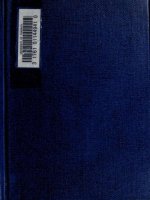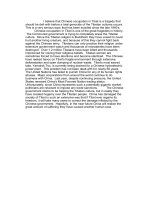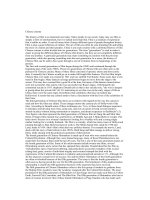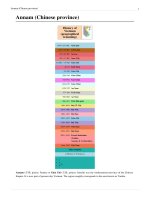best-loved chinese proverbs
Bạn đang xem bản rút gọn của tài liệu. Xem và tải ngay bản đầy đủ của tài liệu tại đây (2.84 MB, 177 trang )
Best-Loved
Chinese Proverbs
Second Edition
q
T HEODORA L AU
WITH KENNETH AND LAURA LAU
This book is dedicated to our family,
whose love and support are beyond compare.
Contents
Introduction vii
A Word about Chinese Calligraphy ix
Pronunciation Key xi
Ability 1
Adaptability 4
Admiration 6
Adversity 8
Anger 10
Beauty 12
Caution 13
Character 15
Compromise 16
Conflict 17
Cooperation 18
iii
Contents
Courtesy 21
Crisis 24
Criticism 25
Deception 27
Defeat 30
Diligence 32
Discretion 34
Falsehood/Gossip 36
Family/Home 39
Fate 41
Fire 43
Foresight 44
Fortune 47
Frugality/Prosperity 51
Futility 53
Greed 55
Happiness 58
Harmony/Contentment 60
Heart 62
Honor 66
Horses 69
Humility 71
Indecision 73
iv
Contents
Inspiration 75
Knowledge 78
Leadership 82
Livelihood 85
Longevity 89
Love 92
Misfortune 96
Moderation 98
Morality 99
Necessity 102
Neighbors 103
Nepotism 104
Obstinacy 105
Opportunity 107
Patience 109
Peace/Good Wishes 112
Perseverance 114
Poverty 117
Prejudice 119
Pride 120
Profit 121
Responsibility 124
Sincerity 126
v
Contents
Strategy 128
Success 136
Superiority 139
Suspicion 141
Talent 142
Thought 143
Trust 144
Victory 145
Wealth 147
Wisdom 150
Worry 154
About the Authors 155
Other Books by Theodora Lau
Credits
Cover
Copyright
About the Publisher
vi
Introduction
T
he first edition of Best-Loved Chinese Proverbs was
published in 1995. In our second edition, we have
added some new interpretations of Chinese proverbs.
We have enjoyed hearing from our readers how these
proverbs have provided inspiration, comfort, and a new
avenue of communication in life’s trials and blessings.
The appeal of Chinese proverbs has always been pro
-
found and universal. The beauty of these statements is
in their brevity and simplicity. Their mission to give a
direct message that will reach the heart and mind of the
reader is often achieved with aplomb and finesse.
These down-to-earth and succinct compositions
summarize and crystallize the penetrating wit and
wisdom of the Han people for the benefit of all. Like
intense beams of light, these proverbs highlight truths
vii
Introduction
in life that are evident but often ignored or unreal-
ized.
The Chinese proverbs here were derived indirectly from
old Chinese texts. Being interpreted in English not only
brings out their timeless value but gives new dimensions in
expression. These well-tested truths of condensed knowl-
edge can once again be used to observe and to instruct.
Most of the proverbs here are poetically expressed
in the words of the author
. They are original verse, not
verbatim translations of any Chinese text. Some are not
even translations at all but are distillations of several
sayings from different sources. Because of the antiquity
of these sayings, all have unknown origins. Different re
-
gions of China may also have different versions. But as
they say
, to truly know a people, know their proverbs.
It is our belief that the value of Chinese proverbs has
only increased with the passing of the ages: they ring
as true today as they have for thousands of years. W
e
have retrieved, molded, and polished these proverbs to
introduce them in a new and revealing light. W
e hope
that you will enjoy this new edition of them as much as
we loved writing them for you.
—Theodora, Kenneth, and Laura Lau
viii
A Word about
Chinese Calligraphy
BY KENNETH LAU
A
ll the Chinese calligraphy here is in the proper
unabbreviated form of original and traditional
Chinese, not the simplified version commonly used in
China today. This traditional form of calligraphy is fol
-
lowed in Hong Kong, Taiwan, and Singapore and is an
important part of Chinese culture.
All the words have auspicious meanings and are
meant to be positive, uplifting, or inspiring. Chinese
characters denoting negative or inauspicious meanings
are generally not exhibited, as their influence is consid
-
ered unlucky and unhappy for people.
ix
A Word about Chinese Calligraphy
There are about five thousand Chinese characters or
words commonly used in the language; when these are
combined, they produce a rich and powerful vocabu-
lary of new words and usage with thousands of pos-
sibilities. Sometimes a single character will suffice—as
in the words “love,” “endurance,” “fortune,” and
“livelihood”—but in most instances compound char-
acters are used to clarify, emphasize, and deepen the
meaning. Compound characters eliminate any possibil-
ity of confusion, double meaning, or misinterpretation,
for written Chinese is precise in expression.
Chinese is a pictorial language based on drawn sym-
bols rather than on sound, as you can see on the fol-
lowing pages. Words are classified according to their
“radical” or root and are located under their corre-
sponding class. If one is looking in a Chinese diction-
ary for a word related to water, such as “juice,” “river,”
“stream,” or “rain,” one will find all these words having
the common sign of water (shu
: ) (radical: ) pre-
ceding the Chinese character and incorporated into the
written form for that word. Likewise, emotions will all
have the sign for heart (x
n: ) contained in their writ-
ten form to describe where the word is derived from.
x
Pronunciation Key
The pronunciation key given here is based on the
modern Chinese phonetic alphabet.
Ability jì
skill, trick
néng
energy, ability
Admiration xiàn envy, jealousy
mù admiration, praise
Cooperation xié jointly, three symbols of
strength
zhù
help, combined effort
xi
Pronunciation Key
Courtesy l etiquette, salute, rite,
ceremony
mào
appearance, proper
manners
Diligence qín single-mindedness,
industriousness
fèn vigorous exertion
Foresight
yu
n extensiveness
xièn sight, vision
Fortune fú wealth, happiness, good
prospects, and
the
ability to enjoy these
blessings
Happiness x
jubilation, joy, felicity,
auspiciousness
xii
Pronunciation Key
Honor róng flourish, abundance
yù
fame, reputation,
renown
Inspiration g
encouragement,
incitement
w
dance
Knowledge understanding
recognition
Livelihood sh
zh
shí
ng
huó
shòu
birth, growth,
procreation
live, alive
Longevity long life, continuity
Love aì emotion
coming from
the center of the heart
xi i i
Pronunciation Key
Morality daò
dé
Opportunity j
huì
Patience nài
x
n
Perseverance r
n
Profit lì
rùn
Sincerity chéng
yì
Strategy cè
lüè
road, way, path
virtue, ethics
chance, opportunity
ability, meet, a moment
endurance
the heart
bear, endurance, a knife
above
the
heart
benefit, advantage
flow,
lubrication,
smoothness
honesty, sincerity
intention, idea,
meaning
a plan, a scheme
a strategy
xvi
Pronunciation Key
Success chéng accomplishment,
acquisition
g merit, achievement,
skill
Superiority y dominance,
preponderance
shì position
Victory shèng success
lì strength
Wealth cái abundance, rich
fù money
Wisdom zhì wit, wisdom
huì brightness, perception,
intelligence
ng
u
xv
Ability
Ability
q
Ability in itself is nothing when
~
Anyone can sail a ship when the sea is calm.
~
but by his ability to retain it.
~
Control the winds by trimming your sails.
Focus your efforts on honing your talents, and you will
~
Limitations are but boundaries created inside
our minds.
~
denied opportunity.
Judge a person not by his ability to make money,
be better prepared to face uncertainty.
2
Ability
~
~
The wind and the waves seem always to favor the
best sailors.
Those with true skill know how to make opportunities
in any environment.
Only time and effort bring proficiency.
First attain skill; creativity comes later.
3
Adaptability
q
Clumsy birds have need of early flight.
Those with less ability should work harder instead
of making excuses.
~
An old broom has its value.
One should value previous contacts and avoid discarding old friends
or people who have helped you before.
~
Make the cap fit the head.
Know where and when to make adjustments.
~
Better to bend in the wind than to break.
~
4
Adaptability
When the wind is great, bow before it; when
~
Any garment will fit one who is naked.
One must adapt to circumstances, just as water
~
A young branch takes all the bends one gives it.
The young can adapt to change with great ease.
~
Fashion is a tyrant who dictates
the rain is heavy, yield to it.
must take the shape of its container.
never-ending changes.
5
Admiration
Admiration
q
One whose breath is felt in heaven.
Denotes a person of great consequence and importance.
~
The best form of flattery is to master the
art of listening.
~
No matter how tall the mountain, it cannot block
out the sun.
A common saying of parents who idolize their offspring and liken
the child’s abilities to the sun.
7
Adversity
q
~
Adversity brings us into deep waters not to drown
us, but to cleanse us.
~
One who has never met adversity will not develop
foresight.
~
Unless there is opposing wind, a kite cannot rise.
Opposition and adversity give us a chance to rise
to new heights.
~
Challenges are the most truthful and strictest of teachers.
~
Adversity is a mirror that reveals one’s true self.
Adversity teaches us life’s most valuable lessons.
8









